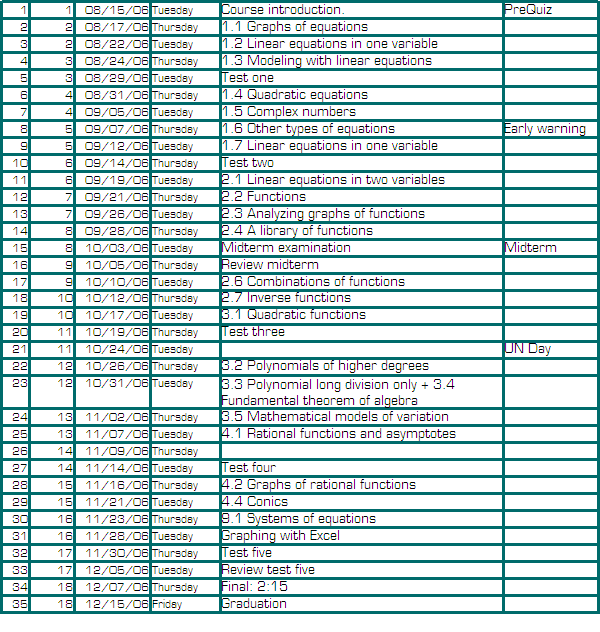
MS 100 College Algebra Fall 2006

Textbook: Algebra and Trigonometry, Sixth edition,©2004, 0618317821. Larson & Hostetler, Houghton Mifflin
Required equipment: Scientific calculator
Office hours: Monday, Friday: 1:00 – 3:00. Walk-in or appointment at other times if available.
Instructor: Dana Lee Ling. Email: dleeling@comfsm.fm Extension 228
Web site: http://www.comfsm.fm/~dleeling/math/algebra/m63/index.html
Attendance: Five absences results in withdrawal from the course.
A late is one third of an absence.
Thus any combination of absences and lates that adds to five will result in withdrawal.
For example, fifteen lates would result in withdrawal.
No betelnut in class or on campus except at cultural huts.
Assessment: Via performance on quizzes, midterm and final examination. Homework and attendance are also valued. Tests occur roughly every fifth class.
Grading policy: Points will be given for attendance, homework, quizzes, midterms, and the final. Grading is based on the standard college policy: Obtain 90% of the points or more to obtain an A, 80% to 89% for a B, and so forth.
Academic Honesty Policy: Cheating on an assignment, quiz, test, midterm, or final will result in a score of zero for that assignment, quiz, or examination. Due to our cramped quarters, the course operates by necessity on a system of personal integrity and honor.
Program student learning outcome
Students will be able to define mathematical concepts, calculate quantities, estimate solutions, solve problems, represent and interpret mathematical information graphically, and communicate mathematical thoughts and ideas.
Course student learning outcomes
Students will be able to:
Graph and solve linear and quadratic equations and inequalities including those with complex roots.
Evaluate and analyze functions and their graphs including combinations and compositions of functions.
Sketch and analyze graphs of polynomial functions and mathematical models of variation.
Determine the domains of rational functions, find asymptotes, and sketch the graphs of rational functions.
Specific student learning outcomes
Students will be able to:
1. Graph and solve linear and quadratic equations and inequalities including those with complex roots.
Sketch the graph of an equation
Solve linear, quadratic, polynomial, and radical equations.
Perform operations with complex numbers.
Solve linear, quadratic, polynomial, and radical inequalities.
2. Evaluate and analyze functions and their graphs including combinations and compositions of functions.
Find and use slopes of lines to write and graph linear equations in two variables.
Evaluate functions and find their domains.
Analyze the graphs of functions.
Find arithmetic combinations and compositions of functions.
Identify inverse functions graphically and find inverse functions algebraically.
3. Sketch and analyze graphs of polynomial functions and mathematical models of variation.
Sketch and analyze graphs of polynomial functions
Use long division to divide polynomials
Write mathematical models for direct, inverse, and joint variation.
4. Determine the domains of rational functions, find asymptotes, and sketch the graphs of rational functions.
Find the domains of rational functions.
Find the horizontal and vertical asymptotes for graphs of rational functions.
Recognize graphs of circles, ellipses, parabolas, and hyperbolas.
Course level assessment of student learning
Course level assessment of student learning will be done via item analysis of the final examination. The item analysis will then be mapped to the outline.